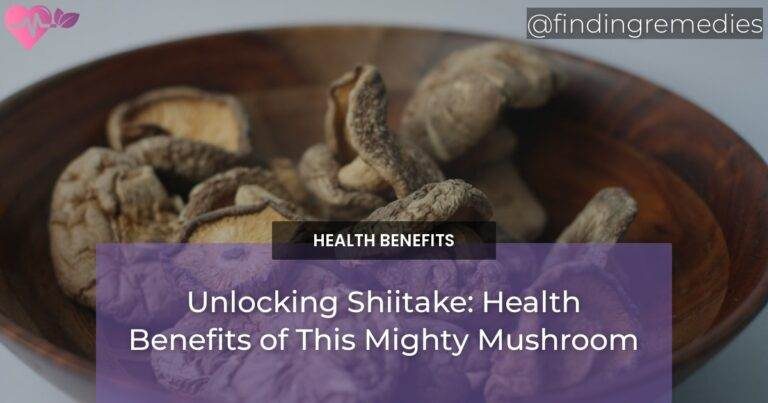Introduction
Shiitake mushrooms are an edible variety of mushroom native to Asia. They have long been used in traditional medicine due to their health benefits. Today, they are popular in various cuisines worldwide and are widely available in grocery stores.
Table of Contents
Nutrition Profile of Shiitake Mushrooms
Shiitake mushrooms are low in calories and high in nutrients. Here is a breakdown of their macronutrient and micronutrient content per 100 grams of fresh mushrooms:
- Calories: 34
- Protein: 2.2 grams
- Fat: 0.5 grams
- Carbohydrates: 6.8 grams
- Fiber: 2.5 grams
- Vitamin D: 6 IU (1% of the daily value)
- Iron: 0.5 mg (3% of the daily value)
- Zinc: 0.6 mg (4% of the daily value)
- Copper: 0.2 mg (9% of the daily value)
- Selenium: 7.2 mcg (10% of the daily value)
- Manganese: 0.5 mg (22% of the daily value)
Compared to other commonly consumed mushrooms like button mushrooms and portobello mushrooms, shiitake mushrooms are higher in fiber, vitamin D, and minerals like copper and manganese.
Natural Compounds in Shiitake Mushrooms
Shiitake mushrooms contain various bioactive compounds that contribute to their health benefits:
Beta-glucans and their immune-boosting properties
Shiitake mushrooms contain beta-glucans, a type of polysaccharide that has immune-boosting properties. Beta-glucans stimulate immune cells like macrophages and natural killer cells, which play a crucial role in defending the body against infections and diseases.
Lentinan and its anti-cancer effects
Lentinan is another polysaccharide found in shiitake mushrooms that has been shown to have anti-cancer effects. Lentinan has been found to stimulate the immune system, prevent tumor growth and metastasis, and enhance the effectiveness of chemotherapy.
ALSO READ
Ergothioneine and its antioxidant properties
Shiitake mushrooms are an excellent source of ergothioneine, a potent antioxidant that protects cells from oxidative stress and inflammation. Ergothioneine has been linked to various health benefits, including reducing the risk of chronic diseases like heart disease, diabetes, and Alzheimer’s disease.
Other bioactive compounds present in shiitake mushrooms
Shiitake mushrooms also contain other bioactive compounds like polysaccharides, terpenoids, and sterols that have anti-inflammatory, anti-tumor, and anti-viral properties.
Health Benefits of Consuming Shiitake Mushrooms
Shiitake mushrooms offer various health benefits, including:
ALSO READ
Improved immunity and decreased inflammation
The beta-glucans and other bioactive compounds in shiitake mushrooms help boost the immune system and reduce inflammation, which can improve overall health.
Lowered cholesterol levels and reduced risk of heart diseases
Shiitake mushrooms contain compounds that can lower cholesterol levels and improve heart health. One study found that consuming shiitake mushrooms daily for four weeks significantly reduced LDL (“bad”) cholesterol levels in the blood.
Anticancer properties and potential for cancer prevention
The lentinan in shiitake mushrooms has been found to have anti-cancer effects and may help prevent the development and progression of cancer.
Positive effects on gut microbiota and digestion
Shiitake mushrooms contain dietary fiber, which can promote good digestion and feed the beneficial bacteria in the gut. This can improve overall gut health and may reduce the risk of certain digestive disorders.
Other potential health benefits
Shiitake mushrooms may have other health benefits, such as improving cognitive function, regulating blood sugar levels, and preventing age-related eye diseases.
Effects of Cooking and Proper Storage of Shiitake Mushrooms
To maximize the nutritional benefits of shiitake mushrooms, it is best to cook them thoroughly. Shiitake mushrooms can be sautéed, stir-fried, roasted, or grilled. Avoid boiling the mushrooms as this can reduce their nutritional value.
Shiitake mushrooms should be stored in a cool, dry place and can last up to a week in the fridge. To prolong their shelf life, you can also dry or freeze them.
Risk Factors and Disadvantages of Consuming Shiitake Mushrooms
While shiitake mushrooms are generally safe to eat, some people may be allergic to them. Symptoms of an allergic reaction can include itching, hives, and difficulty breathing.
Consuming raw or undercooked shiitake mushrooms can also cause toxicity due to the presence of a compound called lentinan. To avoid this, it is best to cook shiitake mushrooms thoroughly before consuming them.
Healing Diseases and Improving Health with Shiitake Mushrooms
Shiitake mushrooms have been used in traditional medicine to treat various diseases and health conditions, such as:
- Cancer
- High cholesterol levels
- High blood pressure
- Weak immune system
- Respiratory infections
- Liver diseases
- Viral infections like hepatitis B and HIV
While more research is needed to confirm these therapeutic uses, shiitake mushrooms show promising potential as a natural remedy for various health problems.
Types and Varieties of Shiitake Mushrooms
There are different types and varieties of shiitake mushrooms, each with its own unique characteristics. Wild shiitake mushrooms grow naturally in forests and are smaller and more flavorful than cultivated shiitake mushrooms.
Cultivated shiitake mushrooms are grown in controlled environments and are more commonly found in grocery stores. They are larger and have a milder flavor than wild shiitake mushrooms.
Conclusion
Shiitake mushrooms are a nutritious and delicious food that offers various health benefits. Incorporating them into a balanced and varied diet can help improve overall health and well-being. With their immune-boosting, anti-inflammatory, and anti-cancer properties, shiitake mushrooms are a powerful superfood that everyone should consider adding to their diet.

